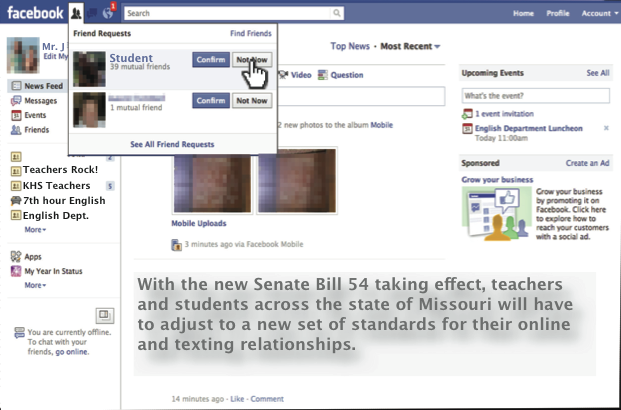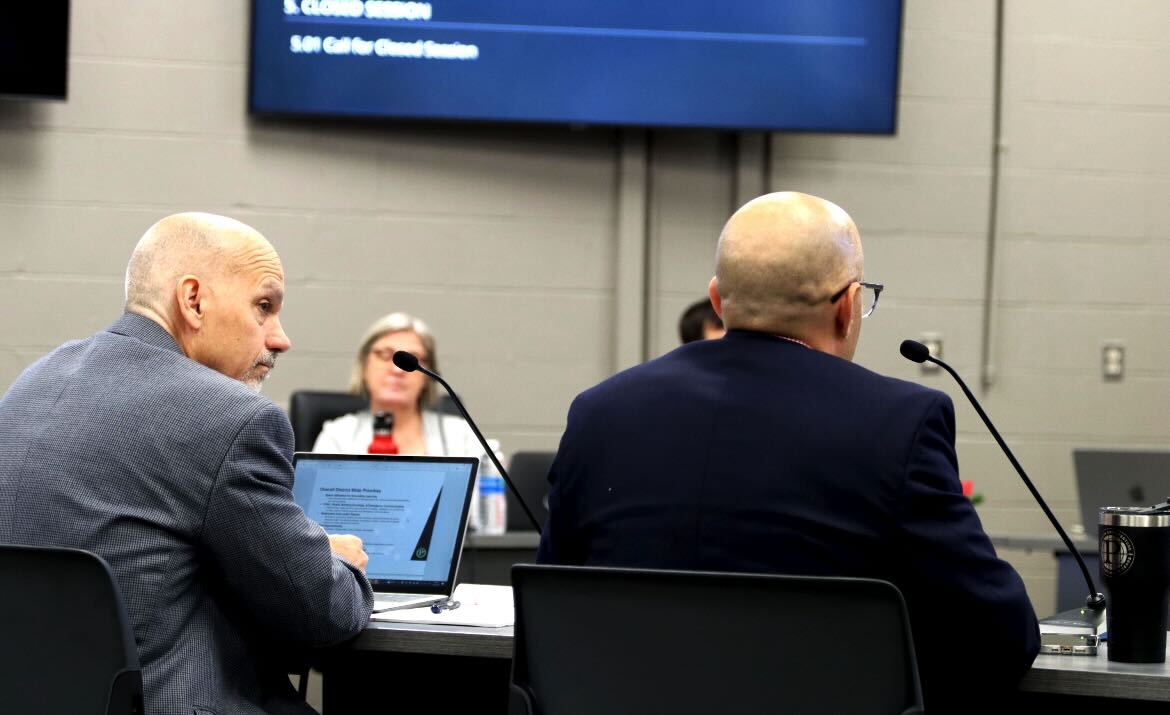It was winter break of her junior year, and Sarah Tucker was beginning work on her take-home test for AP Chemistry. When she came across a question that was missing information, she grabbed her cell phone and sent a quick text to her teacher, Dr. Lisa Autry, asking for help. Through a series of texts, the problem was fixed and Tucker was able to find the correct answer without waiting for school to resume.
Unfortunately for students, this extra help with homework may be harder to access due to a recent act in the Missouri Senate.
On July 14, Governor Jay Nixon signed the Amy Hestir Student Protection Act, or Senate Bill 54, which states that any communication, including Facebook and texting, between students and teachers must be available and appropriate for all audiences.
Senate Bill 54 is designed to protect students from teachers who might have a sexual relationship with a student. Their plan is to add barriers to keep teachers and students from having private contact online. Kirkwood School District is requiring all online pages with teacher-student relations to be fully available to parents and administrators. The school must give permission for teachers and students to have private contact. Also, every private message and text sent to a teacher or student must also be forwarded to a designated administrator, according to Michael Havener, principal.
Ben Sulser, senior and former user of a Facebook group for his AP Chem class, will miss this ease of online contact.
“It’s important for students to feel like they can contact their teachers if they need help with assignments,” Sulser said. “We won’t have that anymore.”
Some teachers are frustrated they will not be able to send these messages to students so easily.
“I would only use [texting] if necessary, which ended up being only a few times a given year, for things like: ‘You left your keys in my room,’ or ‘You left class without turning in your test,’” Lisa Autry, chemistry teacher, said. “In AP Chem, many students texted me during evening hours to ask homework questions.”
Teachers understand that if they want to tell information to a student quickly and efficiently, they must use an online site such as Facebook or Twitter rather than email.
“The problem with email is that teens don’t check it every day. But social networking is like breathing for teens. They just do it,” Bryce Bunton, business teacher, said.
Autry agrees.
“The [Facebook] group made messaging the entire class very easy, and since most students are on [Facebook] a lot, they’d get the messages in a reasonable amount of time,” Autry said.
For Bunton, social networking has become a large part of his curriculum.
“I have a Facebook group, a Facebook page, a blog, a Youtube account, and a Twitter account. I use these sites every day to update the kids about homework, conferences, trips and sharing achievements,” Bunton said.
Other teachers use social networking and texting to contact students. Jason Rekittke, director of instrumental music, texts band members about upcoming events. Basketball coach Bill Gunn texts team members about practices and games.
For teachers like Bunton, Rekittke and Gunn, Senate Bill 54 is aggravating. It may lengthen the time it takes to contact a student because teachers and students can no longer send private messages, use Facebook chat, or send texts without sending any private messages to an administrator and previously having permission from the school, according to Havener.
“I think that the people who formulated the law have no real idea as to how teachers and students use digital resources on a daily basis, and how integrated it is in our lives. The law is well-intentioned, but misguided,” Autry said.
Tucker feels the same way.
“The new law is stupid. It’s group punishment, and group punishment generally punishes the wrong people,” Tucker said.
Ken Wolfe, middle school communication arts teacher and opposer of Senate Bill 54’s new regulations on online contact, feels that Senate Bill 54 is a drastic measure taken to restrain a small amount of teachers.
“Only a handful of teachers have abused social media compared to the amount of teachers that are in Missouri, yet we’re punishing every single teacher,” Wolfe said.
It seems that most teachers and students are in agreement that Senate Bill 54 is a drastic measure with more negative effects than positive.
“Thousands of us have used these electronic resources for years appropriately, effectively and to the benefit of both students and teachers, and are now being set back decades because of a few [inappropriate teachers],” Autry said.













![Of course [people have been mean to me],” Jack Baranski, sophomore, said. “I don’t remember their names though. History forgets those who were judgmental of others’ creativity.”](https://www.thekirkwoodcall.com/wp-content/uploads/2019/11/printout-30-e1572837544286-900x454.jpg)
